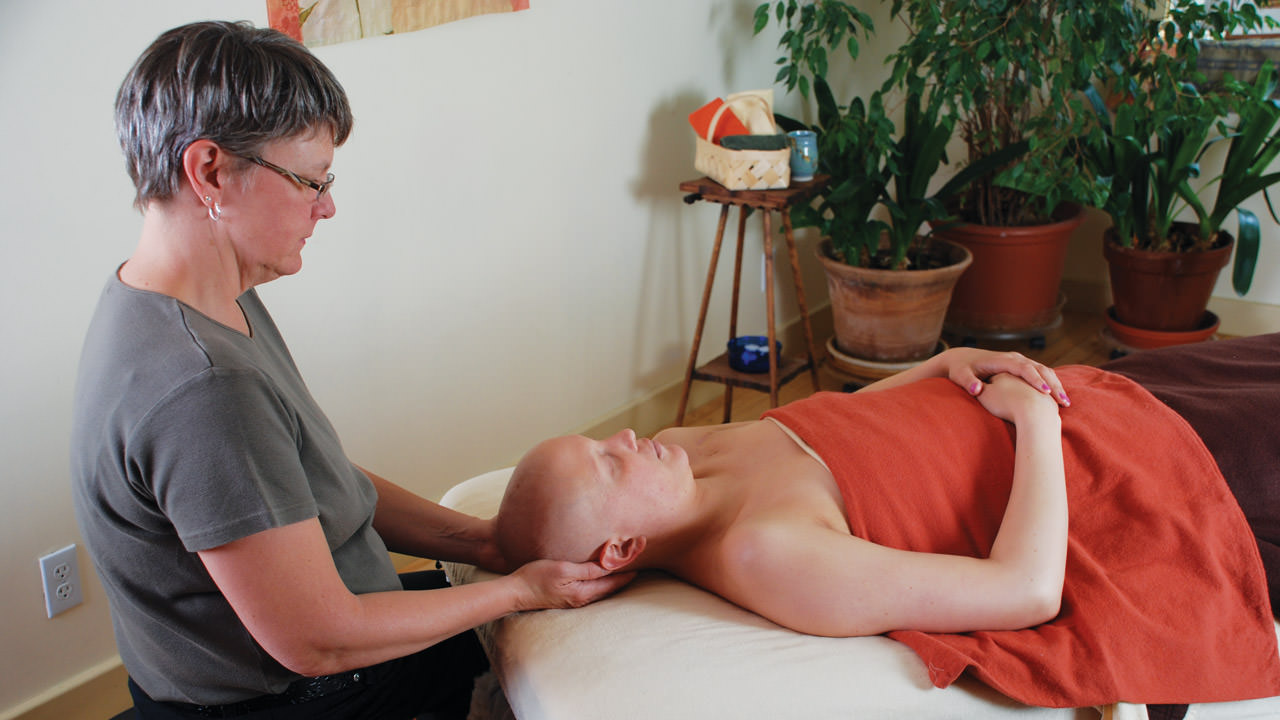The Case for Oncology Massage
Why Study Oncology Massage?
Massage therapists are drawn toward working with different groups. Some have an affinity for athletes, others for the elderly, and those reading this website may feel an inclination toward people who are medically complex, such as cancer patients. Gentler therapies may align with the personality of some therapists, or it may be a good match for the therapist who has overworked their own body throughout the years and wants to slow down.
The most conscious motivation is the desire to help or serve. Practitioners often have a goal to ease physical or emotional pain, to be a soothing, nurturing presence, to give back to the community, or to be part of transforming healthcare. Therapists have much to offer the person affected by cancer, but there is also much to receive from them.

Reprinted with permission from Tracy Walton
At some point in their life, approximately a third of women and half of men will be diagnosed with cancer. For that reason, all massage therapists will encounter clients and patients who have received treatment for cancer. There is rarely a reason to deny a client the benefit of massage therapy, however, people who are in treatment will always require adjustments to their massage session plan and those who have a history of cancer treatment may also need adaptations indefinitely.
Cancer is an umbrella term for more than 100 separate diseases and there are numerous ways to treat these diseases. Learning to navigate the complex nature of the various side effects requires specialty training. To practice oncology massage therapy, therapists need to know what questions to ask clients, when to ask them, and how to use the client’s answers in creating a safe and effective massage treatment plan. It is essential that practitioners can communicate confidently and sensitively with clients in difficult circumstances.
A client requesting oncology massage therapy wants a massage therapist who is well-prepared and practiced, someone who has built their skills through case studies and real-world exercises. They are searching for signs that they can trust the therapist from the first interview question to the last touch. They need to feel seen, heard, and served. Highly trained oncology massage professionals will help change the patient’s experience of cancer.
Oncology massage does not replace standard care but is combined with it to facilitate a new level of healing. The practitioner who specializes in oncology massage will have the opportunity to work as a team member with the patient’s oncologist, surgeon, nurses, physical therapist, and other integrative practitioners.
-
- Support local cancer patients, caregivers, and medical professionals by being listed in our professional directory as a trained oncology massage professional in your area
- Build and deepen relationships within the oncology massage and esthetician communities
- Enhance your knowledge and support lifelong learning
- Network with other professionals and leaders in the field of oncology massage
- Help shape oncology massage therapy as a profession
- Become eligible for reduced rates on S4OM & S4OE Summits, online educational opportunities, and other events
- Become eligible for the Preferred Practitioner Grant Program, an opportunity to grow professionally and provide community service to clients, your local oncology community, and the S4OM community.
- Find support with the S4OM Regional Champion in your area (or become one yourself)
-
Foundational courses offered through Recognized Education Provider (REP) Organizations dispel the myth of cancer as a contraindication to massage and bring an understanding of the pathophysiology of cancer and the adaptation of techniques specific to the side effects or symptoms being experienced. Continuing education in Oncology Massage will build confidence by expanding assessment and clinical skills.
These courses prepare the therapist to:
- offer supportive care during treatment
- communicate with the healthcare team as needed
- assist in management of treatment side effects during long term care
- provide rehabilitative care after treatment
- assist in management of lasting side effects during remission/recovery
- provide comfort-oriented care during hospice
Supplemental courses offered through S4OM Recognized Education Provider (REP) Organizations, or Education Partners, will expand your clinical presence, focus on specific cancer populations, and give instruction in additional care management modalities, such as:
- Advanced Pathophysiology
- Aromatherapy in Cancer Care
- Chair Massage for Oncology Events
- Ethics and HIPAA
- Hospice Care
- Hospital Based Programs
- Lymphedema Management
- Pediatric Oncology
- Scar Tissue Management
- Spa Services and Skin Care
- Well-being and Resilience
-
Individuals diagnosed with cancer face a multitude of challenges. These challenges, which may last a lifetime, often begin at diagnosis and continue through treatment, recovery, and survivorship.
The intention of the Standards of Practice for Preferred Practitioners is to promote the safe, ethical, and appropriate application of massage therapy for those diagnosed with cancer. Preferred Practitioners demonstrate their commitment to competent and professional care by upholding these standards.